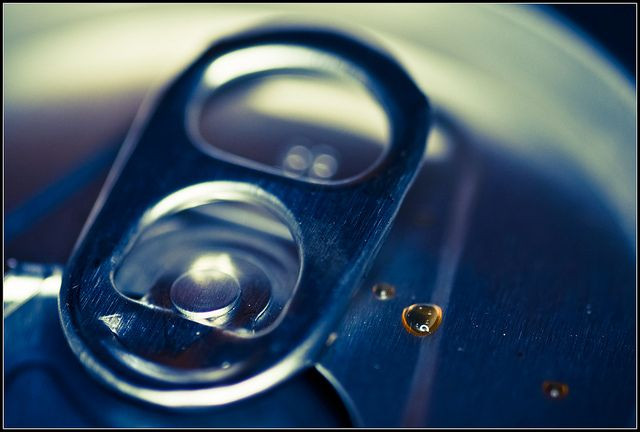Warning Labels Have Potential To Educate Parents When It Comes To Sugary Drinks

Many potentially harmful items come with warning labels: tobacco products, violent video games, CDs with explicit lyrics (if you still buy CDs). Though labels don’t always deter us from buying these products, it does give some people pause when considering their purchase. So, with all we know about how harmful sugar can be to children, one would think sugar-sweetened beverages would come with warning labels too. A new study not only came up with potential labels for these drinks, but it also found labels had an immediate impact on a parent’s decision to buy a sugary drink for their kid.
"In light of the childhood obesity epidemic and studies suggesting that more than half of children under the age of 11 drink sugar-sweetened beverages on a daily basis, there is a growing concern about the health effects associated with consumption of these beverages," said lead author Dr. Christina Roberto, an assistant professor of medical ethics and health policy at Penn Medicine, in a press release. "Some states have introduced bills requiring sugar-sweetened beverages to display health warning labels, but to date, there is little data to suggest how labels might influence purchasing habits, or which labels may be the most impactful."
The study, led by the Perelman School of Medicine at the University of Pennsylvania, found parents were less likely to buy a sugary beverage for their child if it came with a warning label — this was regardless of the parent's education level. Labels detailed everything from how sugar can cause obesity and diabetes to tooth decay. Just this past week, a new study published in Circulation suggested drinking more sugar-sweetened beverages could increase visceral fat .
Researchers conducted an online survey of 2,381 parents who had a child between the ages of 6 and 11. Parents were divided among six groups, where each group was shown images of 20 popular beverages (12 with added sugar) that either had warning labels featuring different variations of the harmful effects of sugary drinks; calorie labels already seen on most soda bottles; or no labels whatsoever. Labels appeared for parents in the label groups when they hovered over an image of a sugary drink.
The researchers found only 40 percent of parents selected a sugary drink for their child after seeing a warning label, compared to 60 percent of the parents who didn’t see a warning and 53 percent who only saw caloric content.
"Regardless of the specific wording, results show that adding health warning labels to sugar-sweetened beverages may be an important and impactful way to educate parents about the potential health risks associated with regular consumption of these beverages, and encourage them to make fewer of these purchases," Roberto said. "The findings are in line with similar studies conducted on the effects of warning labels on tobacco products, which have been shown to increase consumer knowledge of health risks related to tobacco use, and encourage smoking cessation.”
After conducting the warning label experiment, the researchers asked the parents how many would be in support of warning labels on sugary beverages. They found 73 percent were in favor, while less than 6 percent were opposed, with the rest undecided. The researchers also wrote “[m]ost participants reported that a warning label would change their beliefs about a beverage’s healthfulness and that a label would encourage them to purchase fewer of the beverages for their child.”
Some cities around the U.S. have already tried putting warning labels on sugary drinks, most notably San Francisco. The Wall Street Journal reported that after city officials unanimously approved putting warning labels on sugary beverages, the American Beverage Association (ABA) filed a complaint, saying warning labels violated the free speech rights of the First Amendment. The ABA also said the warning singled out certain beverages and conveyed “the misleading and controversial view that they are hazardous in any quantity and more hazardous to health than any other food or beverage about which the city requires no warning.”
Despite the sense it makes, it will still be a while before we see these labels out in the real world, if we ever do at all.
Source: Roberto C, Wong D, Musicus A, Hammond D. The Influence of Sugar-Sweetened Beverage Health Warning Labels on Parents’ Choices. Pediatrics. 2016.



























